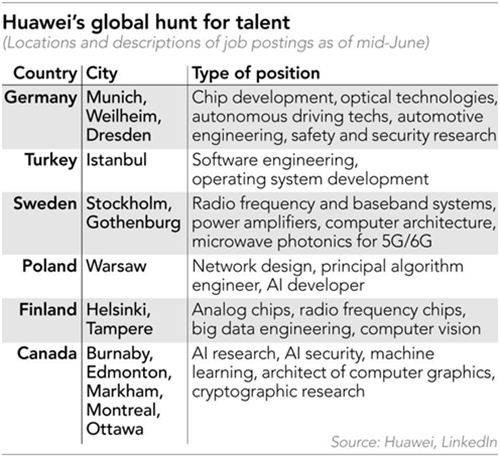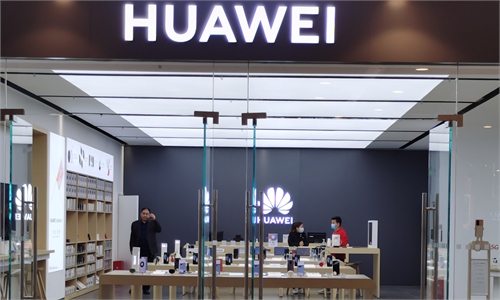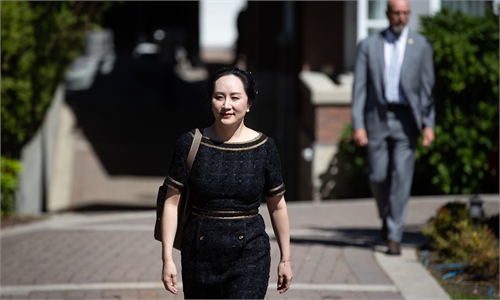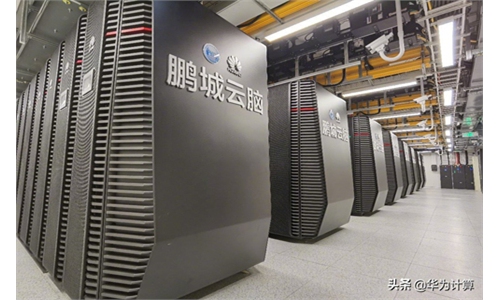COMMENTS / EXPERT ASSESSMENT
The core of the US-China competition is talent

Photo: web
Huawei's ad recruit worldwide talent has generated a lot of attention.For Chinese who have long followed Huawei, this isn't surprising news.
Huawei is unlikely to stop its globalization because of US containment; instead, it will go faster. And for Huawei, its globalization will depend on whether it has the top talent.
Huawei is a high-tech company whose products, technical support, and services have spread across the global communications landscape in recent years.
Huawei is also a Chinese company. To be precise, it started as a Chinese company and gradually went global, becoming a global company like Apple and Microsoft.
Huawei is already a very international company, judging by its personnel composition. According to its latest CSR report, in 2019, the company had more than 37,000 people working overseas out of a total workforce of more than 190,000.
A global company certainly does not mean that it has no national identity. Nonetheless, its people, investments, technologies, products, and the profits are becoming increasingly global.
However, Huawei cannot hide its Chinese identity, nor can it pretend to. Ren Zhengfei himself is a Communist Party member.
More than a decade ago, when Huawei joined forces with European companies and began investing massively in developing 5G technology and expanding its market, similar US companies were left behind.
More than a decade later, when Huawei became the global leader in 5G technology and entered the international telecom market, Washington finally sat up and took notice.
The collision between Huawei and the United States became a condensed version of the conflict between China and the US.
Why are US companies falling behind in this area against Huawei? One reason is that Huawei's talent pool surpasses that of US companies in this field.
Talent is the key to the competition between China and the US.
While it's hard to count how many of the best experts from China have been on the staff of US high-tech companies over the past two or three decades, people of Chinese descent have certainly made a significant contribution.
According to the report, "From the Basics to the Frontier, Chinese American Contributions to the American Fabric," the jobs with the highest percentage of Chinese in the US are software developers, doctors, chefs, computer programmers, accountants, and auditors. Currently, 35 people of Chinese descent are members of the National Academy of Sciences, and 48 are members of the National Academy of Engineering. As of 2018, approximately 18,000 Chinese-American bioscientists, medical scientists, and other life scientists are working in the US.
With Chinese making a remarkable contribution to advanced technology in the US, there is no reason why they cannot contribute even more significant contributions to China.
It was possible until China began to move into high technology after it had built up a manufacturing base, and that's Huawei's advantage.
Huawei also needs global talent to become an international company like Microsoft, Amazon, Google, etc.
In the past, Chinese companies have used Chinese talent to make products and markets. US companies like Microsoft are using global talent to create products and markets. Huawei has been working hard to bridge this gap.
Huawei's biggest challenge is not the disruption of chip supply in the US, but its ability to have more talent and attract global talent.
With Huawei's technological strength and generous pay, Huawei plans to attract even more global talent.
The competition for talent between the US and China has already started to escalate.
The author is a senior editor with People's Daily, and currently a senior fellow with the Chongyang Institute for Financial Studies at Renmin University of China. dinggang@globaltimes.com.cn. Follow him on Twitter @dinggangchina




